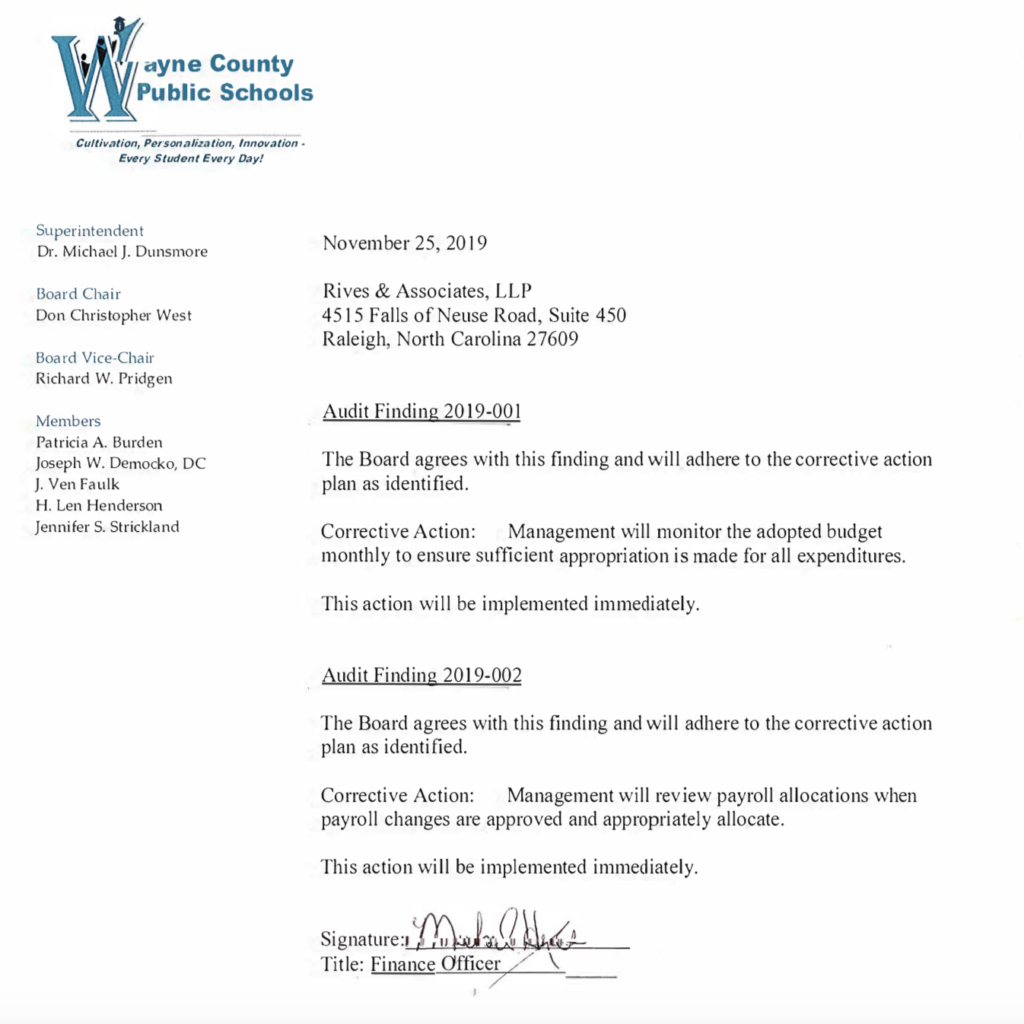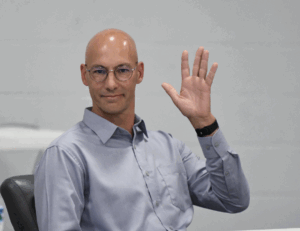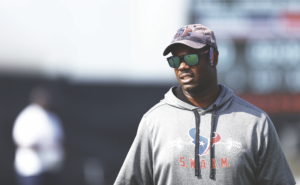
Audit shows 4-year path to negative fund balance; School Board members blame Dunsmore, Central Office
This was not the first year that some Wayne County Board of Education members have heard that there was a problem with money in the district’s general fund — or that there would have to be cuts made somewhere to make up the shortfall.
But they say that the information they were given from the district’s administrators and past auditors did not accurately paint the picture of the direness of the district’s financial situation.
During a special called meeting on Aug. 19, 2019, then-Superintendent Dr. Michael Dunsmore said he and his staff were looking to tighten the district’s belt.
“As I have brought to your attention before, we’re looking at ways, obviously, to save money, to increase our fund balance, which in the last couple of years has been moving in the wrong direction,” he said.
Then-Finance Director Michael Hayes also told the board during the meeting that WCPS staff was “working behind the scenes” to find places “where we can cut money.”
“I think the time has come where every year we have to go through this process,” Hayes said then. “Look at areas where we can save money.”
After Dunsmore and Hayes’ remarks, none of the board members asked questions.
Three months later, an audit was completed by accounting firm Rives & Associates, with a notification allegedly sent to the board.
But a review of the board’s November and December meetings did not indicate that the board acknowledged or discussed the audit findings.
A response from the district, signed by Hayes, which indicated the board “agrees with this finding” and would “immediately” take corrective actions to bring areas of concern that were noted in the audit into compliance was sent, and dated Nov. 25, 2019.

More than six months later, the board would accept Hayes’ resignation — as well as that of Dunsmore.
In the wake of that decision, the board also hired interim Superintendent Dr. James Merrill and engaged School Operations Specialists, a consulting firm, to review the district’s operations and financial procedures.
DISCUSSION OF THE AUDIT AT THE JUNE 3 MEETING
According to information presented to the board June 3 regarding the district’s 2019 audit — the results of which were released to both WCPS and the board in November 2019 and revisited, at the board’s request, at the June 3 meeting — the deficit in the county schools’ general fund has been escalating for more than four years.
That evening, Diana Hardy, an auditor with Rives & Associates, discussed the findings from the district’s latest, required, audit of its financial statements and positions.
Board Chairman Chris West, who took office in 2010, indicated that he had not seen the results of the analysis, including Rives & Associates’ summary of areas of concern in certain spending categories, including central office salaries.
Other board members also indicated that they were not aware of the audit results — or questions about a $3 million “transfer” that was made to the district’s General Fund from the district’s Food Services Fund in 2019.
West did not return a call for comment on the district’s financial health or his knowledge about the district’s financial condition.
Vice Chairman Jennifer Strickland, who has served since 2014 and is a member of the board’s Finance Committee, said she and other board members absolutely did not see the audit findings.
“I heard they were on (Hayes’) desk,” she said.
In addition, Strickland said that while the board knew there was a concern about the diminishing fund balance, members were told by the auditors that “we were in good shape.”
She said board members asked about the most recent audit, but were told there was a delay in getting the report together.
She said the information presented June 3 was a shock to the board.
Strickland said the board relies on the superintendent to present and to oversee the district’s financial picture, adding that the board is not involved in day-to-day operations.
“The entire budget is handled by the superintendent,” Strickland said. “We have to trust that what he is telling us the truth.”
And, she said, it does not appear that Dunsmore told the board the truth.
“I am so mad,” she said.
She added that every time Dunsmore or members of his “cabinet” came before the board to ask to add an additional expense — a new program, lower class sizes or a “raise to keep a good employee” — board members asked if the money was in the budget.
She said they were assured the money was there.
Strickland added that the Finance Committee has not been set up to scrutinize the Finance Department.
“There is not a lot of teeth (in that committee),” she said.
Strickland said she has been receiving many calls about the district’s financial picture — and questions about why the board did not see the crisis coming.
“Do you think if I knew there was fraud or mismanagement going on, I would have let this go on?” she said.
Strickland added that she is on the board “to do what’s right for the county, the schools, the teachers and the kids, nothing else.”
Patricia Burden, who has served since 2014, is chairman of the Finance Committee.
She did respond to questions, but said she is waiting for some answers before drawing conclusions.
“At this time, I don’t have any comment until I get further information,” she said. “I am not trying to hide anything, and I have not been instructed not to talk.”
The other member of the Finance Committee, Wade Leatham, the newest board member who was appointed to replace the late Rick Pridgen, referred all questions to the “public spokesperson for the board,” adding that his newness to the board meant that he was still learning.
He did say that “there is a lot of stuff being said out there that I don’t think is true.”
Board member Len Henderson is also holding his tongue for now, he said. Like Burden, he said he is waiting for more information.
“I am really anxious to find out more about the budget situation,” he said.
Henderson is particularly interested in the findings of School Operations Specialists.
“They started work Friday,” he said.
Henderson, who has been a member of the board since 2016, said he will be looking closely at the results and the district’s finances.
“I am very interested in seeing if some of the things we have done in the past have contributed to this,” he said.
Another of the board’s newest members, Ven Faulk, who joined the board in 2019, said he wants to see the report from School Operations Specialists as well.
“I am anxiously waiting for the investigation,” he said.
As a businessman, Faulk said he knows how critical it is to have staff who can be trusted.
“I rely on a bookkeeper and two CPAs,” he said. “The very minute I find out my bookkeeper and CPAs are not giving me the right information, I am going to find another one.”
He also said he and other board members had to rely on the information district leadership provided.
“We had been assured that we had the funding for the expenditures,” he said.
Quick action is what the board thought would be the best response, Faulk added.
“I want it fixed now,” he said. “We do not need to play around with this.”
He added that he believes the district will come out stronger.
“I hope (the finance department) is going to be a whole lot more transparent,” Faulk said.
That includes finance reports monthly and quarterly, he added.
The last couple of weeks have been tough, he said.
“I have been attacked through social media and email,” he said. “I am on this board because I care about the county and the children. That’s all.”
He is optimistic about the next step.
“We are going to get out of this mess,” he said.
Board member Dr. Joseph Democko, who joined the board in 2018, said he was taken aback by the news he heard during that June meeting.
“I can’t believe the incompetence of our finance department,” he said.
He said he was surprised when he joined the board about how little information is available to board members.
“We are not privy to a lot of things,” he said. “There is a lot that we are not told. Our job is to oversee the superintendent.”
The results of the auditors’ first look should give the board members a better idea of where the county is and what needs to be done next.
But Democko said he already knows what he will suggest.
“We are going to have to put some checks in place,” he said. “From what I have heard, there has been no criminal activity. There has just been overspending.”
And getting to the bottom of what happened, how it happened and setting a course for the future is critical for a county Democko said has the potential to continue to grow and to flourish.
“We can fight, bitch and complain and we can die,” he said. “Or we can work together and stay alive. Going forward, if you are dead weight, you won’t be part of the solution.”
There will be tough choices coming once the district’s financial picture is clear, he added.
“We have got to be more frugal with how we spend our money,” Democko said. “Once we see where we are, we can make some choices. I am afraid we are going to have to make some cuts moving forward.”
Keeping education thriving and strong is not only important for the county’s children, but for future economic development, he said.
Attracting new investment in the community requires providing a quality education system. Making that happen is why he and others got on the board in the first place, he added.
“Wayne County is a wonderful place, and it deserves better than this,” Democko said.
THE AUDIT TRAIL
Prior to Dunsmore’s arrival, the 2014-15 audit was completed by a local firm — Carr, Riggs & Ingram CPAs and Advisors of Goldsboro. The same firm completed WCPS’ 2013-14 audit.
Their findings from both years are on the district’s website and available to the public. Prior years’ reports are also available, although there are some dates missing.
There is no online record of the 2015-16 audit.
In May 2016, the district released a bid proposal for auditing services for fiscal year 2016-17.
The results of that call for bids as well as details of the resulting contractual agreement with the successful bidder, are not in the board’s public documents online.
The audits for 2016-17 and 2017-18 also are not available on the web.
However, after questions were raised about the financial health of the district, and on the heels of Hayes’ resignation, the board posted the 2018-19 audit (for the fiscal year ending June 30, 2019) citing the desire to be “transparent.”
THE FUND BALANCE SLIDE
During Hardy’s presentation, she pointed to a chart depicting the district’s financial health over the last five fiscal years.
The results for 2019-20 (the fiscal year ending June 2020) are not yet available, she said.
According to the audit report’s “Statement of Revenues, Expenditures and Changes in Fund Balances,” which covered the years 2016-2019, the district finished 2016 with a deficit (the difference between revenues and expenditures) of $73,743 and a fund balance of $7,017,875.
The next year, 2017, the district ended the year with a deficit of $778,223 — a deficit uptick of 955 percent — and a fund balance of $6,280,314.
In 2018, the district recorded a $3,491,395 deficit — a deficit uptick of 349 percent — and a fund balance of $2,755,873.
In 2019, the deficit was up to $11,982,691, a 243 percent increase from the previous year, while the fund balance moved from positive territory to -$2,416,692. However, additional liabilities increased the district’s deficit load to $5,394,060.
The auditor highlighted four areas where significant increases were posted over the same period. School Leadership increased 98 percent from 2016 to 2019, with incremental jumps until 2019, when spending spiked from $535,525 in 2018 to $1,023,760 in 2019. Systemwide Support Services, Support and Development, spending increased from $273,798 in 2016 to $1,077,298 in 2019. Significant increases also were noted in technology and financial and human resources support.
In addition, the audit firm included some statistics from the end of the 2014-15 school year.
That year, WCPS finished with a fund balance of $7,091,618 and ended the year in the black with $1,553,793. The deficits began the following year.
Dunsmore was hired as the district’s superintendent in May 2015. He followed long-time Superintendent Steve Taylor, who left his post at the end of 2014.
Before his departure, Dunsmore indicated that there were a variety of factors influencing the district’s $5 million deficit — an Exceptional Children funding discrepancy from the state; a slight decrease in average daily membership — the student enrollment number used to allocate state-funded resources to the district — and some cuts in state and federal funding. He said the district had used some of those state and federal funds to offset some of its “over-allocation” expenses, including extra classes and personnel.
In the auditor’s presentation, it was noted that state and federal funding have increased steadily over the years, with $125,454,638 in the fiscal year ending June 30, 2015, and $140,103,732 in the fiscal year ending June 30, 2019.
Numbers provided by Dunsmore and members of his cabinet during the district’s 2020-21 budget presentation indicated that the local funding that the county receives has also increased — from $19,835,579 in fiscal year 2018-19 to $21,325,991 in 2019-20 — an increase of $1,490,412.
However, the amount the county has provided the district for capital outlay has stayed steady at $2 million.


A loaded discussion

Fighting for their lives

Goldsboro loses a giant

“I’m a flippin’ hurricane!”
Public Notices — Feb. 8, 2026

Belting it out

Legendary

Final Four!


